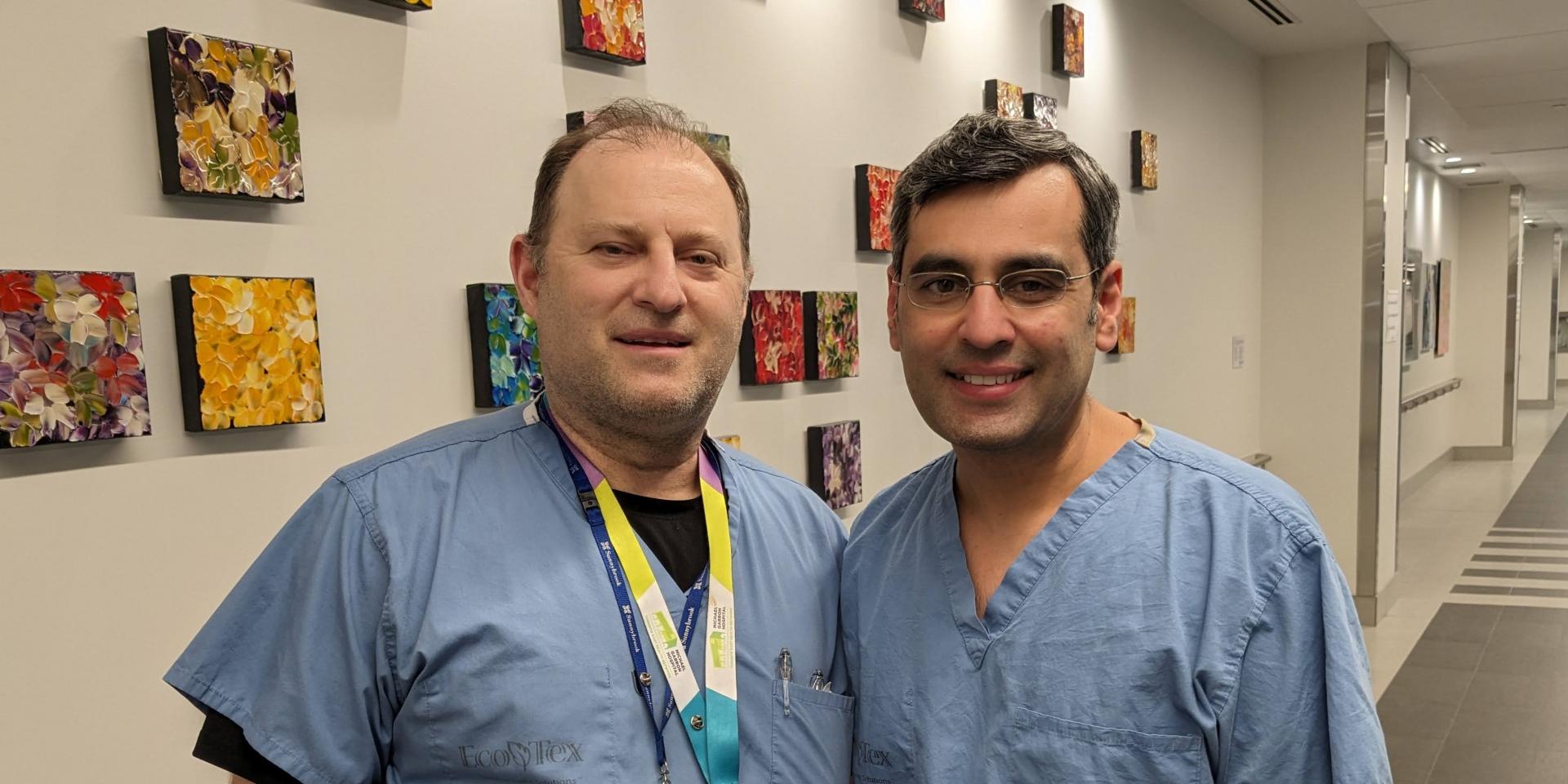Dr. Weisbrod, an ophthalmologist, has known Dr. Zia for ages. They’ve worked together at Michael Garron Hospital for 12 years; their offsite medical offices are side-by-side; and when Dr. Zia’s mother nearly lost vision in one of her eyes, Dr. Weisbrod deftly restored it using a highly complex surgery at our hospital.
So when Dr. Weisbrod required a procedure to open a blocked artery in his heart, he was grateful to be in the trusted hands of his colleague and friend, Dr. Zia, our hospital’s Chief of Cardiology.
Dr. Zia leads a comprehensive team at Michael Garron Hospital that delivers highly skilled, compassionate heart care – from the diagnosis of cardiac issues through to treatment and recovery. We provide this care, close to home, to the many people in East Toronto who live with heart disease.
Experiencing chest discomfort, Dr. Weisbrod went to his local emergency department at Sunnybrook Health Sciences Centre, which has partnerships with our hospital in cardiology and several other areas.
He underwent an angiogram that was performed by Dr. Zia, who also practices at Sunnybrook. During an angiogram, cardiologists use real-time imaging to guide them as they insert a thin flexible tube, called a catheter, into a blood vessel in the wrist and delicately move it to the heart. From there, the catheter releases a dye that makes the heart’s arteries appear more clearly on the X-ray imaging.
This allows doctors to detect problems in the arteries, including those narrowed or blocked by plaque, malfunctioning heart valves and other serious issues.
A reassuring approach
Dr. Weisbrod’s angiogram revealed a blockage in his right coronary artery.
After weighing his treatment options, he chose angioplasty. During the procedure, Dr. Zia directed a catheter equipped with a tiny balloon and stent (a wire mesh tube) to Dr. Weisbrod’s artery. He then expanded the balloon and stent to open the artery, leaving the stent in place to help prevent it from closing again.
Mildly sedated but conscious throughout this intricate procedure, Dr. Weisbrod says it was fairly painless. “Dr. Zia had a very caring, reassuring and efficient treatment approach,” he adds.
This is the calibre of care that Dr. Zia and his colleagues provide at Michael Garron Hospital, which is one of just five hospitals in Toronto to offer advanced cardiac care.
Heart disease prevalent in East Toronto
Angiograms and angioplasties are done in a high-tech facility known as a Cardiac Catheterization Lab, or cath lab for short. At Michael Garron Hospital, our cardiology team uses our cath lab to perform over 1,500 procedures annually. But demand for these services is increasing.
The community we serve has a particularly high incidence of heart disease. Contributing factors include an aging population, lower income levels and elevated rates of diabetes, which increases risk for heart conditions.
As well, many members of our community are more likely than others to develop cardiovascular issues due to genetics. People of South Asian heritage, for instance, are four times more likely to have heart disease.
To meet the high and growing demand for advanced heart care in East Toronto, we’re fundraising to expand our cath lab and double its capacity. This will involve building and equipping a second, state-of-the-art procedure room, as well as enlarging and modernizing the cath lab’s patient preparation and recovery area.
This new capacity will enable us to perform up to 3,000 procedures annually, offering vital services to more patients while sparing them the stress of travelling farther from home.
Our community needs you
Did you know the Ontario government doesn’t fund the purchase of new hospital equipment or related renovations? We can only expand our cath lab with the support of donations.
As Chief of Ophthalmology at Michael Garron Hospital, Dr. Weisbrod knows the critical role philanthropy plays in allowing us to acquire leading-edge equipment. “I’m grateful to donors for enabling us to do what we love to do, which is to strengthen the health of our vibrant community,” he says.
Likewise, Dr. Weisbrod is thankful to Dr. Zia for the skilled and compassionate care he provided.
“Just one week later, I was able to get back to work, carrying out clinical duties and teaching. It’s amazing how far we’ve come with angioplasty,” he adds.
Preparing for angioplasty: helpful tips
As a surgeon and patient, Dr. Weisbrod brings a somewhat unique perspective. He offers the following tips for patients getting ready for an angioplasty:
- Be informed – Reputable online resources can help you understand what happens during angioplasty and, importantly, can help you think of questions for your cardiologist. Being informed may make you feel more at ease.
- Know that it’s a fairly painless procedure – For a treatment that involves placing equipment inside your body, “there’s very little pain for most patients,” says Dr. Weisbrod. That’s because blood vessels don’t have nerve endings to send pain signals to your brain as the catheter passes through.
- Relax as much as possible – While this is easier said than done, you can proactively take steps to calm yourself. Meditative breathing, positive thinking and placing trust in your cardiologist are all beneficial.
